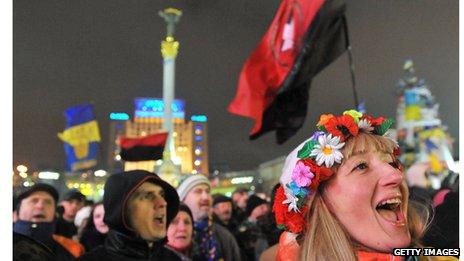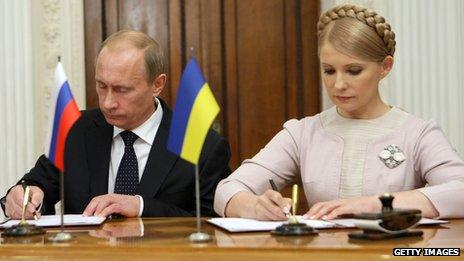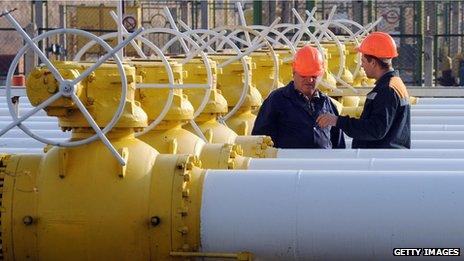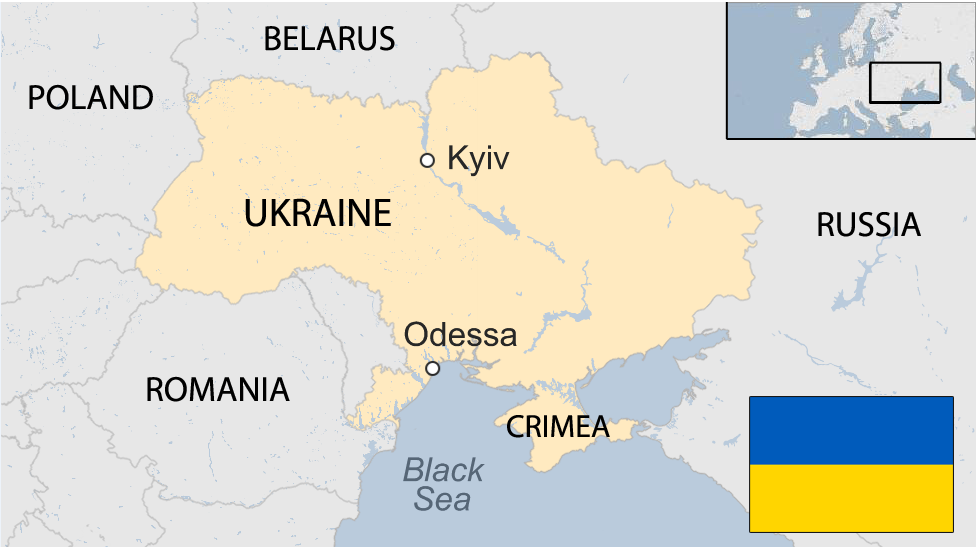Russian bailout masks Ukraine's economic mess
- Published

Political protests have obscured Ukraine's deep economic problems
There is no shortage of grim data that could illustrate Ukraine's troubled economic condition.
But perhaps the most damaging statistic is to do with gas prices.
Ukrainian consumers pay approximately 20% of the wholesale price of gas, leaving the state with a huge bill and destabilising the state-run energy monopoly Naftogaz Ukrainyi.
Poor deal
Successive governments have been unwilling to upset voters by raising the price of gas, which has contributed to the government's strained financial position.
To make matters worse Ukraine has struggled to negotiate favourable deals with its main gas supplier - Russia.
Back in 2009 the government signed a 10-year deal with Russia that has been described as "disastrous" as it saw Ukraine pay much more than European nations for gas.

In 2009 Ukraine signed a unfavourable gas deal with Russia
Although Ukraine has negotiated a discount since then, gas imports have caused other economic problems.
To help pay for the gas, Ukraine's central bank has been propping up the Ukrainian currency the hryvnia.
Reports say the central bank has recently spent around $800m defending the currency, which has helped deplete the nation's foreign currency reserves.
The expense of propping up the currency and subsidising gas has made international investors reluctant to lend money to Ukraine.
To borrow money on the international markets, Ukraine was facing interest payments of more than 8%, which is extremely high for a national government.
Financial crunch
But Ukraine needed fresh funding.
Next year it has to refinance around $7bn worth of foreign debt and almost $3bn of that was owed to the International Monetary Fund.
That pressure meant Ukraine's President Viktor Yanukovich badly needed the $15bn of financing from Russia.
And in the short term the financing from Russia will prevent the nation heading for default.

Ukraine's energy market needs reform
But it will not fix Ukraine's deeper economic problems.
Lilit Gevorgyan Senior Economist at IHS Global Insight says Ukraine has suffered from a "toxic combination" of poor economic policy making and a slump in demand for its exports of steel and capital goods, like industrial machinery.
As mentioned above the nation's currency is kept artificially high to help pay for imports, including gas, as well as keeping foreign debt servicing low.
But that has made Ukraine's exports much less competitive on the international markets. Ukraine is a big exporter of steel and machinery but those exports have slumped, partly because of the strong currency, but also weak demand from customers in Europe.
Ms Gevorgyan says that since Orange Revolution of 2004 governments have failed to take tough decisions that would stabilise the economy.
And that stabilisation is sorely needed as the economy has been in recession for more than a year.
- Published5 March 2020
- Published27 January
